Dr. Damodar Dharmananda Kosambi
(31 July 1907 – 29 June 1966)
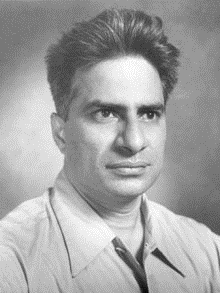
Dr. D. D. Kosambi was an Indian mathematician, statistician, philologist, historian and polymath who contributed to genetics by introducing Kosambi map function. In 1944 he published an article titled “The Estimation of Map Distance from Recombination Values” in ‘Annals of Eugenics’ (https://onlinelibrary.wiley.com/doi/epdf/10.1111/j.1469-1809.1943.tb02321.x) in which he introduced what later came to be known as Kosambi map function. His contribution in genetics is remembered after name along with a mathematical expression as Haldane function. As per his equation genetic map distance(w) is related to recombination fraction (θ) in the following way.
w = 1/4 ln[(1+2θ)/(1-2θ)]
Kosambi’s mapping function adjusts the map distance based on interference which changes the proportion of double crossovers.
In the commemoration of his contributions in Genetics, a joint international lecture series webinar has been organized by SPPU & NABI on 31 July-2 August 2020.
Schedule of Webinar
(Time as per IST)
Day 1: Saturday 31st July 2021
Welcome & Introductory Remarks
Prof. A. B. Nadaf, Coordinator,
Savitribai Phule Pune University, Pune.
Inaugural Address
Prof. Nitin Karmalkar,
Hon’ble Vice-Chancellor,
Savitribai Phule Pune University, Pune
Inaugural Talk
Prof. Rajeev Varshney,
Research Program Director,
ICRISAT & Adjunct Professor,
Murdoch University, Australia .
Plenary Talk by Guest of Honor
Prof. A. K. Shasany,
Director, NIPB, New Delhi, India .
Concluding remarks & Vote of Thanks
Dr. Rupesh Deshmukh, Coordinator NABI
First Session
Chair: Dr. Narendra Kadoo, Co-Chair: Dr. Manish Tiwari
Prof. Marcus Heisler,
The University of Sydney, Australia
Prof. Mohamed A. Farag,
Cairo University, Egypt
Day 2 : Sunday, 1 st August 2021
Second Session
Chair Prof. A. B. Ade, Co-Chair Dr. Shri Ram Yadav
Prof. Robert Henry,
University of Queensland, Australia
Prof. Ashok Giri,
CSIR-National Chemical Laboratory, Pune
Third Session – Research Scholar’s Session
Chair: Dr. Mukul Joshi, Co-Chair: Dr. Prafull Salvi
Mr. Harshal Dhondge
Ms. Vacha Bhat
Mr. Swapnil Kadam
Ms. Vandana Thakral
Ms. Shreeja Sudhakar
Concluding Remarks and Vote of Thanks
Dr. Vitthal Barvkar (Coordinator, Savitribai Phule Pune University, Pune.)
Speakers
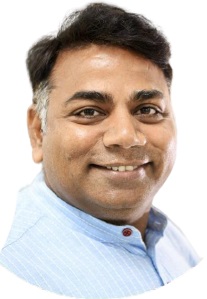
Prof. Rajeev Varshney
Research Program Director- Accelerated Crop Improvement, at ICRISAT, Hyderabad, IndiaAdjunct Professor, Murdoch University, Australia
Email: R.K.Varshney@cgiar.org
https://scholar.google.com/citations?hl=en&user=Kdmxy8EAAAAJ&view_op=list_works&sortby=pubdate
Prof. Rajeev Varshney is Research Program Director- Accelerated Crop Improvement, at ICRISAT, based in Hyderabad, India. He has a Ph.D. in Agricultural Botany (Molecular Biology) from CCS University, India. He holds an Adjunct/ Honorary position with > 10 organizations, and provides leadership to several organizations by serving as member/chair for several committees, editorial boards, funding organizations, and advisory boards, etc.
He is recognized as a leader in genome sequencing, genomics-assisted breeding, translational genomics and capacity building in international agriculture. Among different noted contributions, he has genome sequence of 10 crops including Pigeonpea, chickpea, groundnut, and pearl millet and several molecular breeding products in chickpea and groundnut to his credit. Under his strategic leadership, as a Principal Investigator, to Tropical Legumes projects, 266 improved legumes varieties and production of about 498,034 tons of certified seeds with the benefit potential to over 25 million smallholder farmers in 15 countries in sub-Saharan Africa and South Asia have been achieved.
He is a JC Bose National Fellow and is a recipient of the highly prestigious Shanti Swarup Bhatnagar Prize, ICAR-India’s Rafi Ahmed Kidwai Award from the Government of India. He is an elected fellow of all four national science and agriculture academies of India (INSA, NASI, IASc, and NAAS) as well as of several foreign science academies including the German National Science Academy, The World Academy of Sciences, America Association for Advancement of Science, Crop Science Society of America, and American Society of Agronomy. He is a recipient of several prestigious awards including Professor Jayashankar Life Time Achievement Award-2019, GD Birla Award for Scientific Research-2019, Professor Lalji Singh Achievement Award- 2019, Career360 Outstanding Faculty Research Award- 2018, China’s Qilu Friendship Award-2015, Illumina Agricultural Greater Good Initiative Award-2013, etc.
He is a highly prolific author with more than 450 high-quality research papers/articles, notably 15 papers in Nature journals. He has h-index of 104 with more than 43900 citations. Thomson Reuters/ Clarivate has recognized him as a highly cited researcher for the last 7 years in a row and honoured him with Research Excellence India Citation Award-2015.
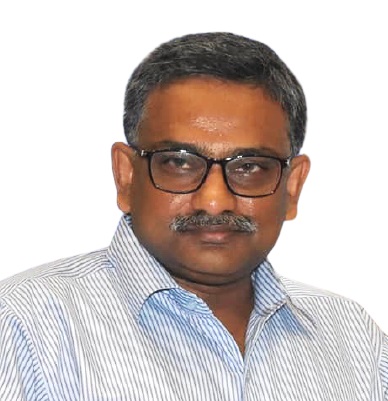
Dr. Ajit Kumar Shasany
Director, ICAR- National Institute for Plant Biotechnology (NIPB), Pusa Campus New, New DelhiChief Scientist at CSIR-Central Institute of Medicinal and Aromatic Plants, Lucknow, India
Email: director.nipb@icar.gov.in; ak.shasany@cimap.res.in
https://scholar.google.co.in/citations?hl=en&user=xbZnGaIAAAAJ&view_op=list_works&sortby=pubdate
Prof. Ajit Kumar Shasany, is heading the ICAR- National Institute for Plant Biotechnology (NIPB) as a Director. Before that, he worked as a Chief Scientist at CSIR-Central Institute of Medicinal and Aromatic Plants, Lucknow, India. His major area of interest includes genes and molecule prospection, pathway genomics, synthetic biology; metabolic engineering of medicinal and aromatic plants for human health.
He led the very promising and exciting genome and transcriptome sequencing project of “Holy basil” Ocimum sanctum and other species, at CSIR-CIMAP. He has more than two hundred publications, patents and several distinguished fellowships and awards. In addition, he led Aroma Mission of CSIR to improve the livelihood of farmers and entrepreneurs through aromatic plant cultivation and value addition.
He has a long list of awards and fellowships. Some of them are CSIR young scientist award in biological sciences in 2000, Prof. Umakant Sinha Memorial award (Indian Science Congress Association) in 2003, Indian Drug Manufacturers’ Association for Best Patent-(Team) in 2004. Som award for developing high yielding Mentha arvensis, Kosi by Essential oil Association of India-(Team) in 2005. CSIR- Technology Award Biological Science for three years- 1999, 2012, 2018. He was fellow at National Academy of Agricultural Sciences in 2017 and at National Academy of Sciences (India) Allahabad in 2018
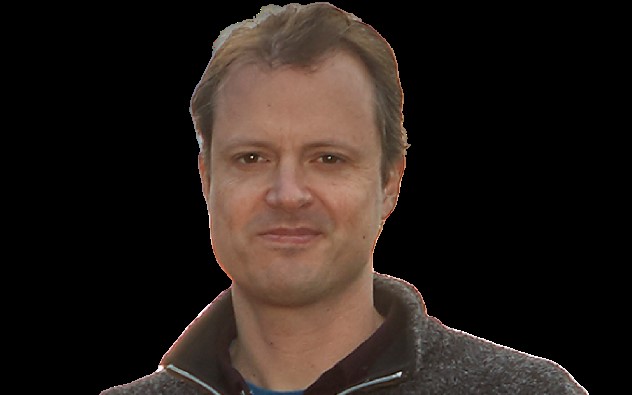
Dr. Marcus Heisler
Associate Professor at School of Life and Environmental Sciences,The University of Sydney, Australia.
Email: marcus.heisler@sydney.edu.au
https://scholar.google.co.in/citations?hl=en&user=S7pTMb4AAAAJ .
Prof. Marcus Heisler is an Associate Professor at School of Life and Environmental Sciences, The University of Sydney, Australia. He is a developmental biologist who is interested in pattern formation in plants. He studied flower development during his PhD in the laboratory of Professor David Smyth at Monash and done his postdoc at the California Institute of Technology (Caltech). He studied how plant organs are positioned. There he initiated research on the plant hormone auxin and cell polarity and developed novel techniques to enable the imaging of live plant shoot apices. Later, he joined Caltech as Senior Research Associate and then joined the European Molecular Biology Laboratory (EMBL) in Heidelberg Germany. He has awarded with a prestigious European Research Council (ERC) starting grant worth 1.5M Euros over five years. He has more than thirty publications in high impact factor journals and his team’s research is focused on understanding cell-cell signalling in cell polarity, and dorsoventral boundaries control in plant morphogenesis. Dr. Heisler has more than 6500 citations and h-index is 26.
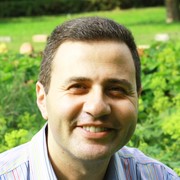
Prof. Mohamed Ali Farag
TWAS fellow in AgricultureAlexander von Humboldt fellow
Visiting Professor, American University in Cairo (AUC) Cairo, Egypt
Professor, Faculty of Pharmacy, Cairo University, Egypt.
Email: mohamed.alifarag@aucegypt.edu
https://scholar.google.co.in/citations?hl=en&user=nWjY6yoAAAAJ
Specializing in metabolomics, natural products chemistry, and plant biochemistry, Mohamed A. Farag completed his PhD at Texas Tech University, USA, in 2003. In 2005, after spending time as a postdoctoral fellow at The Samuel Noble Foundation, USA, and the James Graham Brown Cancer Center, USA, he became assistant professor in 2005 at the Faculty of Pharmacy, Cairo University, Egypt.
Since 2009, Dr Farag has been working as a part time visiting professor at the Technical University of Munich, Germany, to participate in teaching plant metabolomics and chemomterics modelling for master students, and in 2009–2010 he held the Alexander von Humboldt fellowship at the Leibniz Institute for Plant Biochemistry, Germany where he focused on developing metabolomics tools for quality control of nutraceuticals. Dr Farag now works as a visiting professor at the Chemistry department, American University in Cairo (AUC) where his research work focuses primarily around applying innovative biochemical technologies (metabolomics) to help answer complex biological questions in medicine, herbal drugs analysis and agriculture.
Dr. Farag has been recognized with several awards, including Abd el Hameed Shoman award (2016), Jordan, Egypt Excellence Award in medical sciences (2018), Higher State Incentive Award (2012), TWAS award in science diplomacy (2014), and the Mass Spectroscopy Performance Award, TTU, USA (2004). He has coauthored more than 210 scientific papers of more than 5000 citations and an H index of 39. In 2010, Dr. Farag was selected as a top researcher in the field of plant biology in Africa by the American society of plant biology, USA.
Dr. Farag is a current TWAS fellow in Agriculture from Egypt. He is the Managing editor of the esteemed multi-disciplinary journal Journal of Advanced Research. He also served as associate editor in journals Scientific Reports, Peer J and as guest editor in Molecules and Foods. https://www.researchgate.net/profile/Mohamed_Farag6
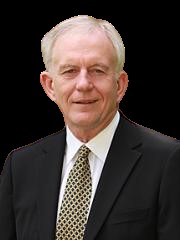
Prof. Robert Henry
Professor of Innovation in AgriCentre for Crop Science,
The University of Queensland, Australia.
Email: robert.henry@uq.edu.au
https://scholar.google.co.in/citations?hl=en&user=qcIHTAsAAAAJ
Professor Henry, is a graduate of the University of Queensland, B Sc (Hons), Macquarie University, M Sc (Hons) and La Trobe University (Ph D). In 2000 Professor Henry was awarded a higher doctorate (D Sc) by UQ for his work on analysis of variation in plants.
He is currently Professor of Innovation in Agriculture. Before being appointed QAAFI Director (May 2010-September 2020), he was Director of the Centre for Plant Conservation Genetics at Southern Cross University, a centre which he established in 1996. Other previous positions held by Professor Henry include Research Director of the Grain Foods Cooperative Research Centre (CRC) (until 2010) and Research Program Leader in the Queensland Agricultural Biotechnology Centre (until 1996).
Professor Henry's speciality research area is the study of agricultural crops using molecular tools. He is particularly interested in Australian flora and plants of economic and social importance and has led the way in research into genome sequencing to capture novel genetic resources for the diversification of food crops to deliver improved food products.
He has more than 1000 (research gate) high impact publications, books and many book chapters. The ISI has identified him as one of the 100 most cited scientists in agriculture in the international scientific literature over the last 20 years
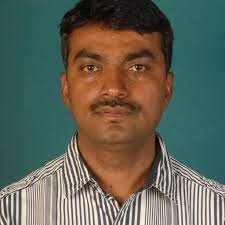
Prof. Ashok Giri
Senior Principal Scientist,CSIR- National Chemical Laboratory Pune India and Professor, Academy of Scientific and Innovative Research
Email: ap.giri@ncl.res.in
https://scholar.google.co.in/citations?hl=en&user=F4FghAsAAAAJ
Dr. Ashok Giri is a well known scientist in the field of biochemistry winner of Max Planck Partner Group Award–Germany with h-index: 44, a Senior Principal Scientist and Professor, Academy of Scientific and Innovative Research. He has completed his Ph.D in biochemistry from Dr. Babasaheb Ambedkar Marathawada University, Aurangabad, Maharashtra, India. He has more than 200 highly cited international publications and claimed several patents.
He was a Borlaug Fellow at University of Nebraska, Lincoln, USA. Raman Research Fellow at Weizmann Institute of Science, Rehovot, Israel,
At Max Planck Institute for Chemical Ecology, Jena, Germany he has worked as Alexander von Humboldt Return Fellow and Max Planck Postdoctoral Fellow.
He was visiting scientist at reputed institutes like School of Biological Sciences, Washington State University, Pullman, USA, and Plant Research International, Wageningen, Netherland.
